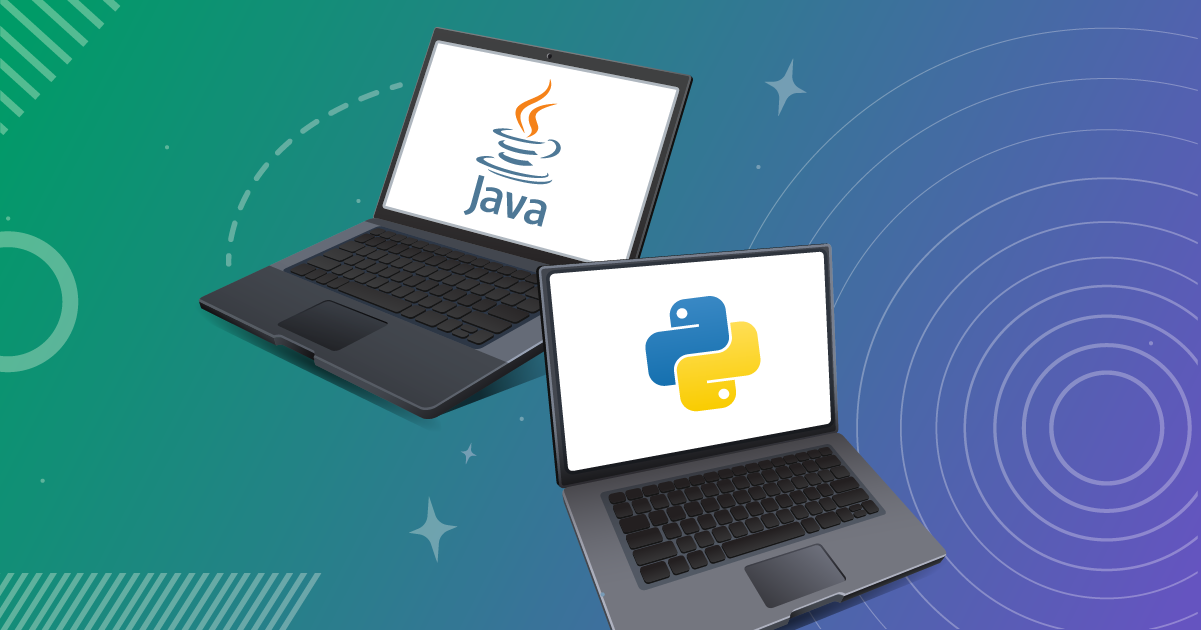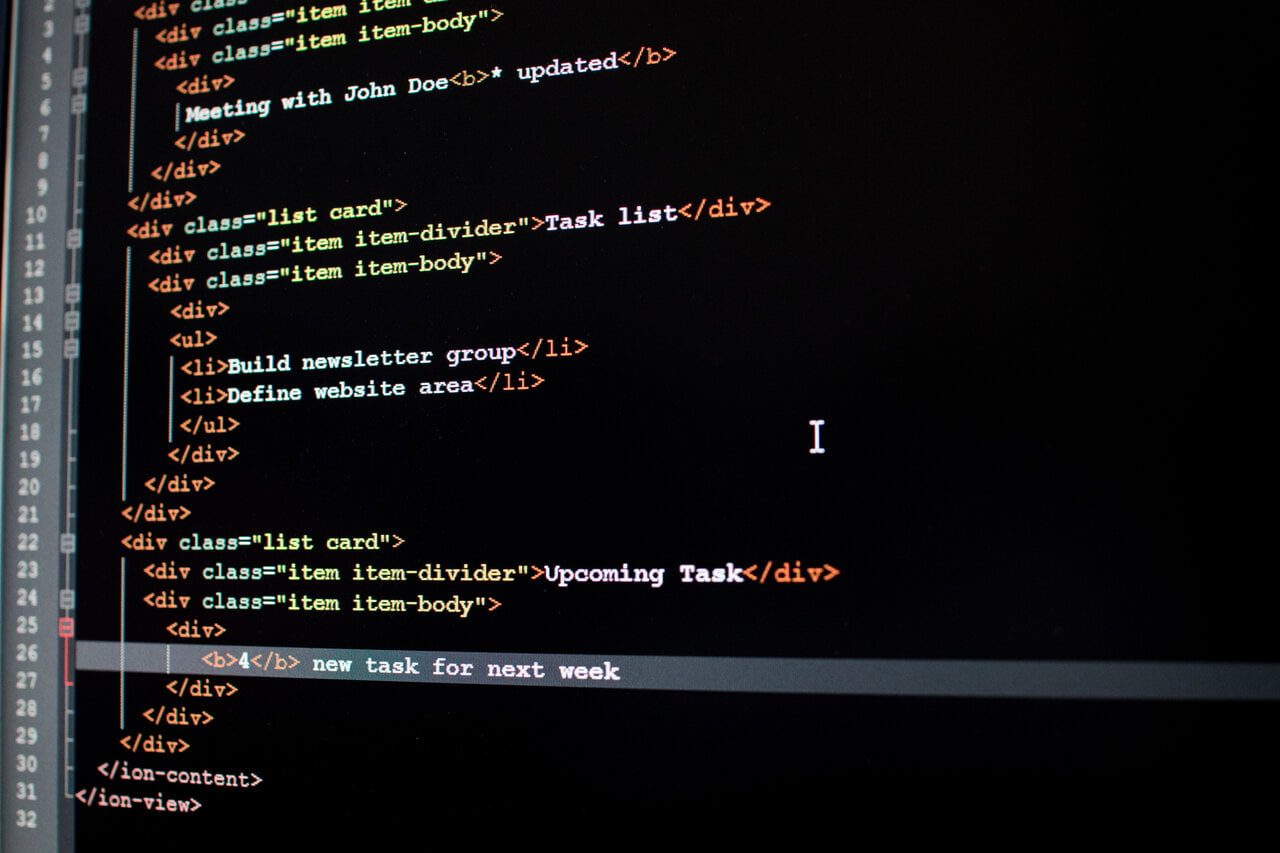It's hard for most technologies to remain relevant for over a decade. Even after more than two decades on the market, it’s clear Java has built a reputation for being widely-used by programmers to build a variety of products.
In the era of digital transformations and with new technologies emerging constantly, it's incredible that the Java programming language is still voted as one of the top ten most popular programming languages in the world.
This is remarkable, especially considering that it has been around since 1995!
Understanding the pros and cons of using Java code in your projects can give you a new perspective, especially if you are considering changing your tech stack. If you need to refresh your memory or make a decision on whether to use Java for your next project - keep reading.
Basics of Java
Java is an object-oriented programming language that adheres to the Write Once Run Anywhere approach.
Java is widely used in Android development, web applications, governmental websites, big data technologies like Hadoop and Apache Storm, and scientific projects like natural language processing. It has been a dominant player in the mobile industry since the early 2000s.
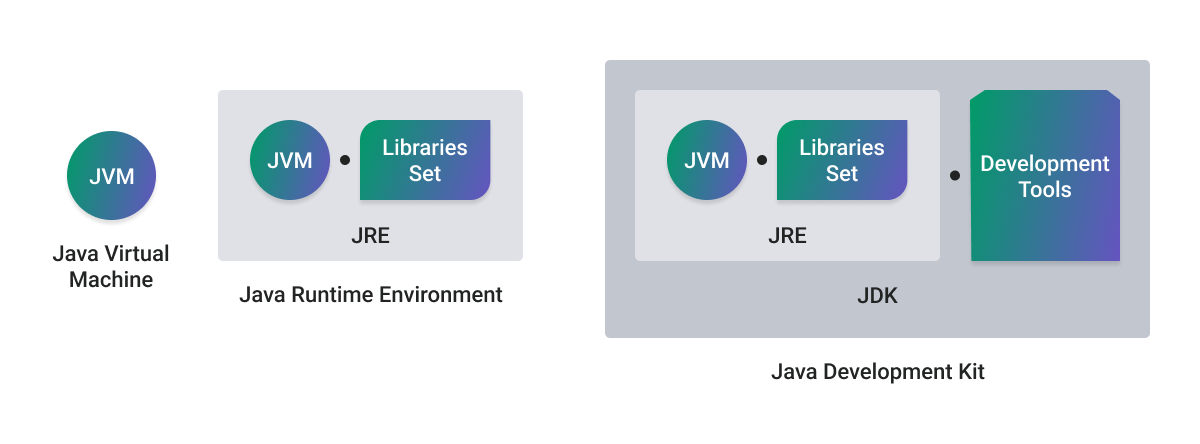
Java offers an ecosystem of tools for development, including:
- Java Runtime Environment
- Java Development Kit
- Integrated Development Environment
Java has a long history and has earned its place in the Programming Hall of Fame, as evidenced by its top position in the TIOBE index for over a decade.
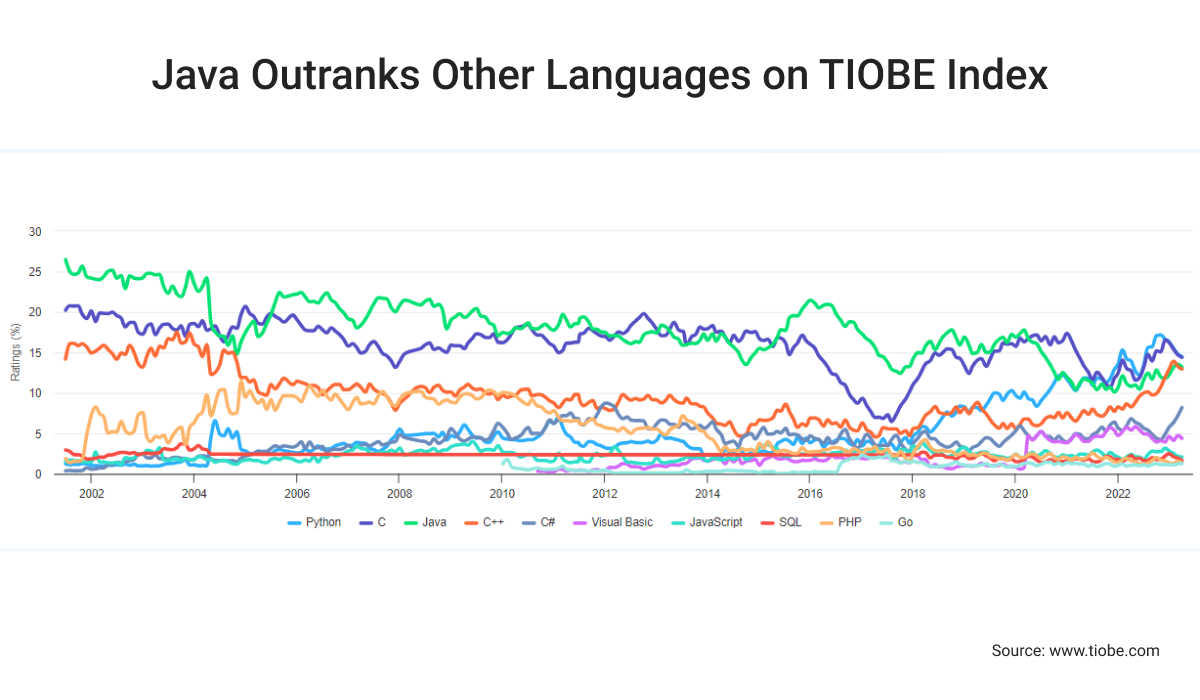
Java's popularity stems from the fact that it's a general-purpose programming language. It uses object-oriented programming schemes and is used for desktop, mobile, web, and enterprise applications.
Of course, Java is far from being the only language that can cover all those purposes. However, it does stand apart from other languages with its reputation for stability, portability, simplicity, and flexibility.
What is Java Programming: The History and Impact
Wherever your turn, you can find Java code. As one of the primary languages for Android application programming, it can be found in many mobile applications, even in times before smartphones started dominating the market.
Java was dominating mobile even in pre-smartphone days – the first mobile games in the early 2000s were mostly made in Java. Many enterprise apps, natural language processing projects, and other apps are based in Java as well.
It's a fact that Java made quite a lot of changes in the 2000s when it appeared. One of the first big things was incredible flexibility. Java quickly showed the importance of embracing object-oriented programming that became an industry-standard in the years to come.
Test-Driven Development tools (TDD) stopped being just a new trendy practice but the key element of every software development project. After it proved its usefulness on numerous Java projects, the JUnit in the 2000s is often seen as one of the biggest things in the industry brought by Java.
Java is also comparatively cheap to maintain since you don’t have to depend on a specific hardware infrastructure and can run your servers on any type of machine you may have, which helped it gain users and fans.
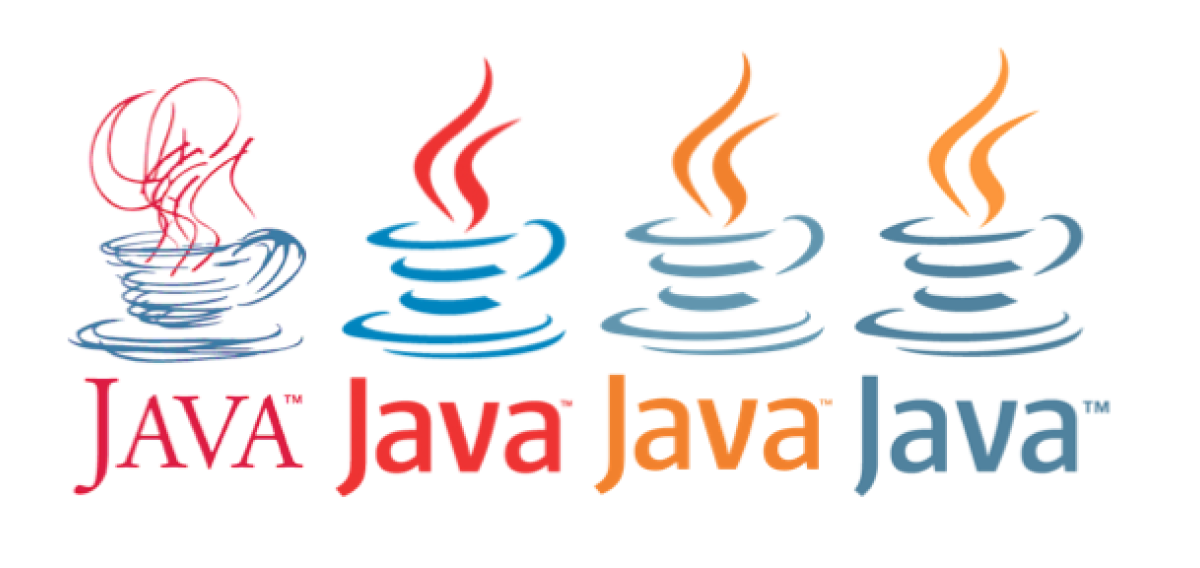
Advantages of Java
Even though it's not the only officially supported Android application programming language, Java is still keeping up with all the big players.
In general, most of the benefits of using Java for app development are due to Java being an object-oriented programming language with a write-once-run-anywhere approach.
Java is an Object-Oriented Programming Language
Object-Oriented Programming is known as a concept that significantly influences different types of data and their structure and functions.
In contrast to another approach – procedural programming – where you have to follow a sequence of instructions using variables and functions, OOP allows you to group these variables and functions by context, thus labeling them and referring to functions in the context of each specific object
Using OOP prevents errors by having objects hide some information that shouldn't be easily accessed. Plus, it makes programs more organized and pre-planned and offers better maintenance and legacy code modernization.
Simple Syntax for Easier Learning
Java derived its syntax from C++, and that's why it closely resembles the C code. Luckily for developers, Java is much simpler and allows beginners to learn it faster and code more efficiently.
As a high-level language, Java actually uses some of the rules from human languages. Any high-level language needs compilers and interpretation that speeds up development, making it easy to use, interpret and maintain Java-based applications.
Created the Standard for Enterprise Computing
Dating back to the 1990s, one of Java's greatest strengths has consistently been enterprise applications. With its wide array of libraries that serve as the building blocks of any enterprise system, Java provides developers with the ability to create any function required by a company.
Its integration capabilities are impressive, with most hosting providers supporting Java. Perhaps most importantly, Java is comparatively inexpensive to maintain since it does not require specific hardware infrastructure and can run on any machine.

Extensive Talent Pool
The availability of skilled Java developers also makes it easier for companies to find and hire the right talent for their development projects, which can save time and money in the long run.
Java is frequently used as an introductory language in schools and universities, so it's no surprise that there are many developers who are familiar with this programming language.
Java is a Secure Language
There is no language immune to errors, even the most popular programming languages. No language, regardless of its complexity and reputation, can protect developers from creating vulnerabilities as they are something a part of the process.
However, what Java can do is prevent some of the most basic security flaws. By using a Security Manager, you can create a security policy for each application where you need to make specific access rules.
Java is a Distributed Language
Java is designed to work as a distributed language and has a pre-integrated mechanism for sharing data and programs in a network of computers for better performance and to improve the overall efficiency of Java software development.
With its integrated mechanism for sharing data and programs among multiple computers, Java enables easy remote collaboration, great for companies with workers around the world or working from home
Java stands apart from other programming languages due to its integrated mechanism for distributed computing, eliminating the need for external APIs.
The Java-specific technology for distributed computing is known as Remote Method Invocation (RMI), which offers the benefits of Java, including security, platform-independency, and object-oriented programming.
Furthermore, Java supports Socket Programming and the CORBA distribution methodology, enabling the sharing of objects between programs developed in different languages.
Platform-Independent (Write Once Run Anywhere!)
Sun Microsystems used this phrase to describe Java's cross-platform capabilities. Using Java Virtual Machine, it's possible to share a big part of your code with different operating systems, such as Windows, Mac, or Linux, to speed up development.
Java's platform independence feature enables it to be a portable language. This means that since Java code can run on any platform, it helps provides versatility and portability for companies.
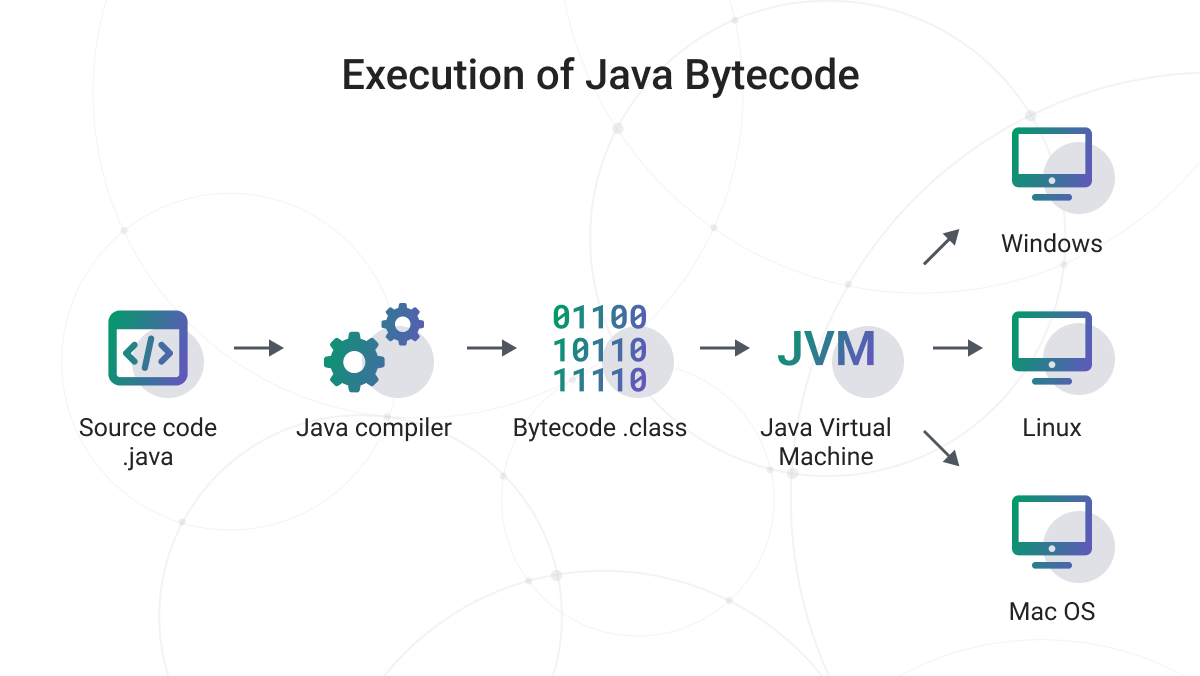
Java Provides Automatic Memory Management
Garbage Collection is an automatic memory management strategy used by Java. It helps to save the memory that is no longer used and to prevent any memory leaks. Garbage collection works by periodically scanning the program's memory for objects that are not in use anymore.
The process is automatic, and it doesn't require programmers to intervene while making their job much easier.
Java has Massive Community Support
With every new version of Java, more and more developers start to engage with Java globally. It has a massive ecosystem of tried and tested libraries and reliable frameworks for different uses.
Since most developers start with Java during their studies, they continue to utilize it as their first language, and keep it as an asset. Incredibly, there are over 1000 Java-related courses on Udemy and 300+ on Coursera!
One of Softjourn's Java engineers, Orest Guziy, said that he appreciates the great community Java has which has helped it to develop over time. Since Java changed its release processes to every 6 months, Orest said, "A lot of attention has been brought to Java".
| What is Java good for? | |
|---|---|
| Businesses like Java because: | Developers like Java because: |
|
|
Java supports Multithreading
Java enables developers to run multiple threads simultaneously to maximize the utilization of CPU time through a process called multithreading.
Each thread is the smallest unit of processing and shares the same memory area, allowing for quick switching between them. Since threads are independent, if one encounters an exception, it won't impact the others.
Multithreading serves as a powerful tool for improving the performance, responsiveness, and scalability of Java programs. This capability is particularly beneficial for gaming and animation applications.
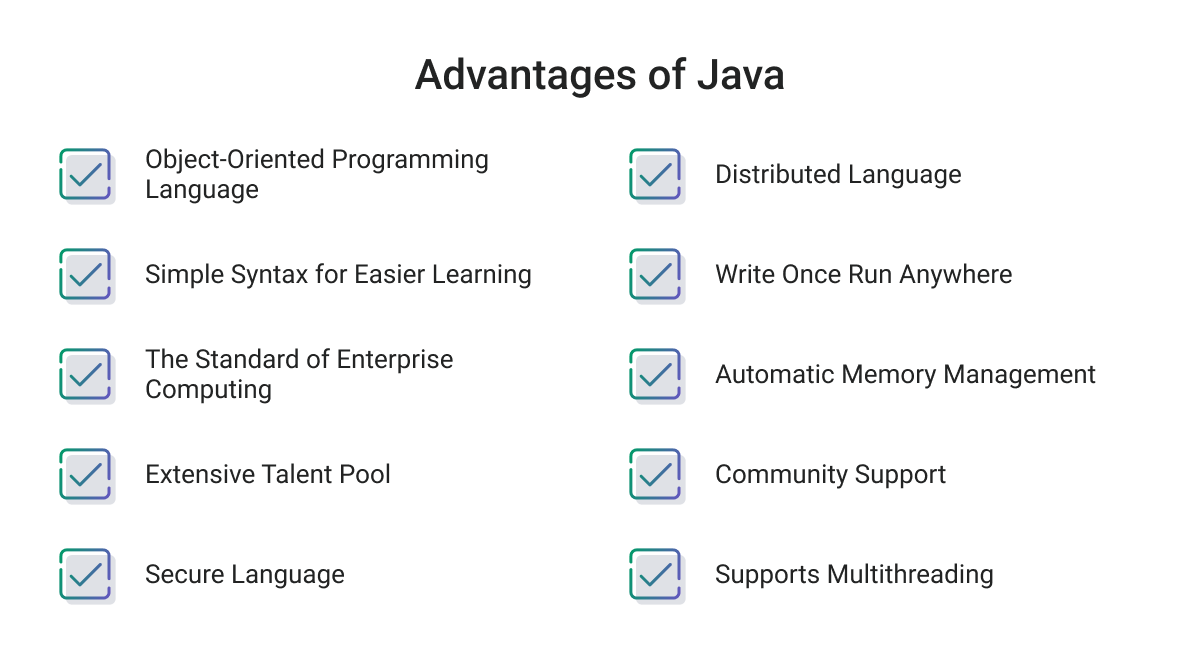
Cons of programming in Java
Before starting any big or small project, it's good to understand the cons of using Java.
Java Requires a Paid Commercial License
Java is free to download and use for commercial use, but there may be some costs involved in using some of its enterprise features.
Starting in 2019, Oracle announced that it will begin charging for business, commercial, or production use of Java Standard Edition 8. This means that users will need to pay for updates and bug fixes based on the number of users or per processor.
Previously, the current version of Java was available for redistribution for general purpose computing, free of charge. Companies now need to assess how much of Java they utilize and determine if switching to an alternative technology is more cost-effective than upgrading to the paid version.
Poor Performance
One of the factors that can affect the speed of a high-level language is the compilation and abstraction level of a virtual machine, and Java is no exception. However, there are other reasons for Java's reputation for poor performance.
For example, the garbage collector is a useful feature that can lead to significant performance problems if it take a high percentage of CPU time. Additionally, bad caching configuration can cause excessive memory and garbage collection usage, and thread deadlocks can occur when several threads try to access the same resource.
While these problems can be prevented with a team of experienced java developers with good planning skills, they can add up and cause varying degrees of damage.
An Unattractive Look and Feel on the Desktop
When it comes to desktop UI, Java shows some serious downsides. While Java might look great when used for Android apps, since there’s Android Studio that supports native app development, it doesn't fit the bill for looking native on Desktop.
Unless you’re using templates, you’ll notice interface inconsistencies, no matter the GUI builder you work with. That makes it extremely important do the research when choosing the best GUI builder for Java.
High Level of Code Complexity
Complex code means that it uses too many words, which makes it hard to scan for mistakes. Since C++ was very hard to understand, the idea behind Java was to become less complex compared to it.
When compared to its more sleek competitor Python, Java appears more clunky and wordy, which may be a turn off to some developers.
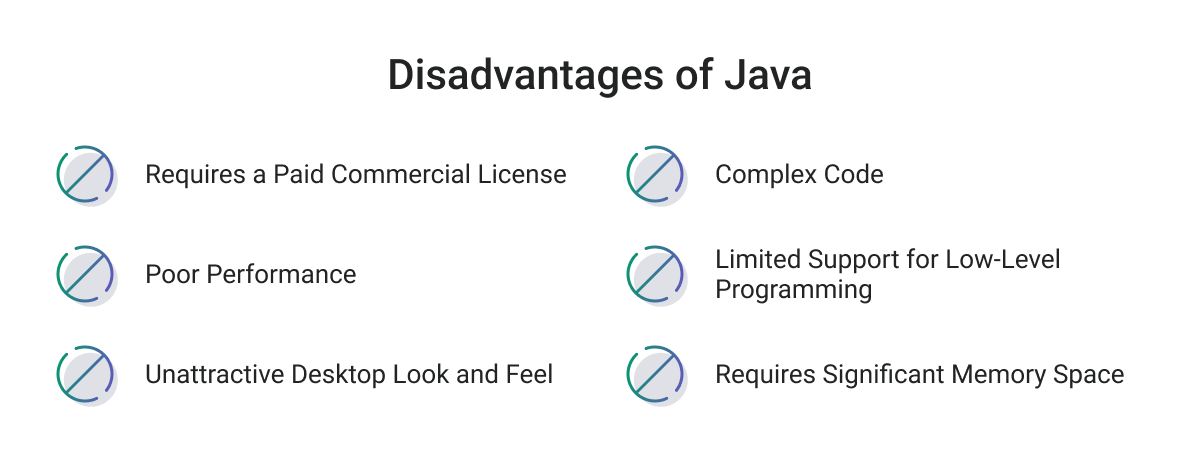
Limited Support for Low-Level Programming
Java is primarily designed as a high-level programming language, which can limit its ability to interact directly with machines. As a result, it may not provide extensive support for low-level programming compared to other languages.
Java Requires Significant Memory Space
When compared to C and C++, Java may consume more system memory, especially during garbage collection, which can lead to a decrease in system performance if not properly monitored.
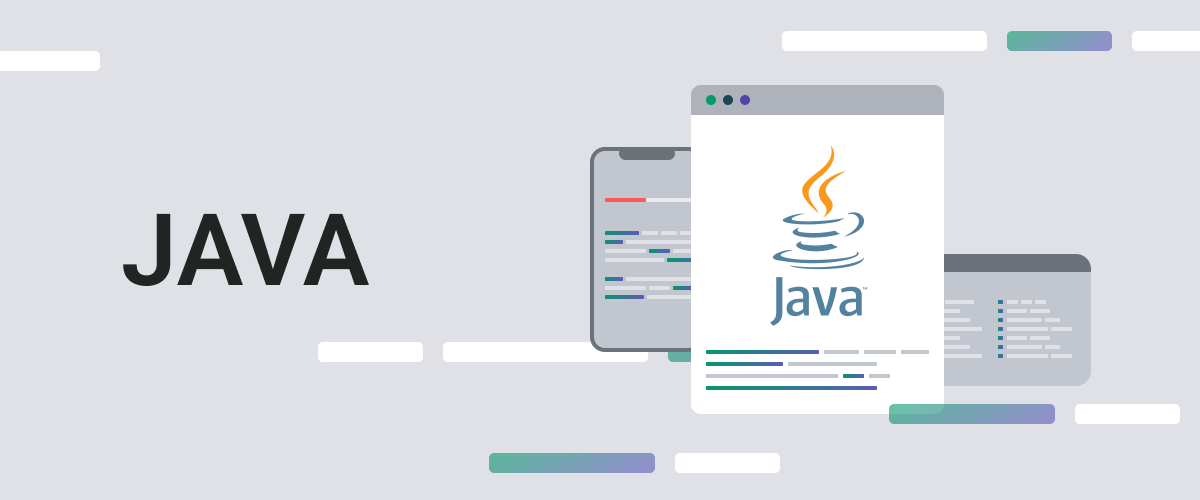
What is the Java programming language used for?
Java is a ubiquitous technology that is more pervasive in our daily lives than we may realize. In fact, statistics suggest that up to 97% of Enterprise Desktops run Java, while in the US, around 89% of personal desktops are installed with Java Runtime Environment (JRE).
Java programming language has a wide range of uses, the following are some of the most used cases where Java programming language outshines other programming languages.
Software Products
Java programming language was used to create Apache storm, Eclipse, Gmail, Open Office, Atlassian, and many other well-known products with millions of users.
Financial Industry
One of the most popular languages in the financial industry is nonother than Java. As it can be used both on the server and client side, it creates reliable and fast websites, and it's often used for data simulations.
Java also is popular for trading applications. For example, Murex, a popular bank management program for front and back connectivity, is written in Java.
Android Applications
Even with new platforms appearing, Java is, for many, still the language of Android applications. Java developers see themselves as Android developers on the market.
Big Data
Java is used in big data technologies such as Hadoop and Apache Storm. Hadoop is an open-source software framework used for distributed storage and processing of big data. Apache Storm is a distributed real-time computation system for processing large streams of data fast. Java is also used to build Apache Spark, Apache Flink, and Apache Be.
Internet of Things (IoT)
Java is a popular language for IoT development because of its portability, scalability, and security features. Java can be used for developing IoT applications that run on embedded devices, gateways, and cloud servers. Some of the use cases of Java in IoT include smart homes, smart cities, industrial automation, healthcare, and transportation.
Java Frameworks & Libraries
These frameworks offer a range of features and capabilities for Java developers, catering to different application development needs and preferences:
| Framework | Description | Examples |
|---|---|---|
| Spring Framework | A comprehensive framework for building enterprise Java applications | Netflix, Alibaba, Cisco, Ticketmaster |
| Google Web Toolkit (GWT) | A toolkit for building browser-based applications using Java | Google, IBM, Twitter, OpenTable |
| Hibernate | An ORM framework for simplified database interaction | Red Hat, Oracle, JBoss, Atlassian |
| Struts | A popular MVC framework for developing web applications | Sony, Vodafone, IBM, Lockheed Martin |
| Play Framework | A high-productivity web application framework | LinkedIn, Walmart, Verizon, Samsung |
| Grails | A Groovy-based web application framework | Netflix, Best Buy, SkyScanner, LinkedIn |
| Apache Wicket | A component-based web application framework | Apache Software Foundation, LinkedIn, Twitter |
| JavaServer Faces (JSF) | A Java-based framework for building user interfaces | IBM, Cisco, Oracle, Liferay |
| Dropwizard | A lightweight framework for building RESTful web services | Yammer, Artifactory, Groupon, Microsoft Azure |
Libraries
| Library | Description |
|---|---|
| Apache Commons | A collection of 43 modular libraries covering various domains like Collections, Math, Database, etc. |
| Google Guava | Provides utilities, collections, string manipulation, concurrency utilities, and more. |
| Jackson | A suite of data processing libraries supporting various data formats and types. |
Real-world examples: Companies that use Java
Most companies use Java in one way or the other. If not for the apps they developed, then for other tools they require in the product development process.
Java is a programming language of choice for numerous tech giants such as Google, Airbnb, Instagram, Pinterest, Uber, Netflix, Spotify, and many more.
These companies have opted for Java primarily due to its powerful features that enable the development of high-performance software. Additionally, Java also enhances the security and scalability of enterprise applications, which is crucial for online-based businesses.
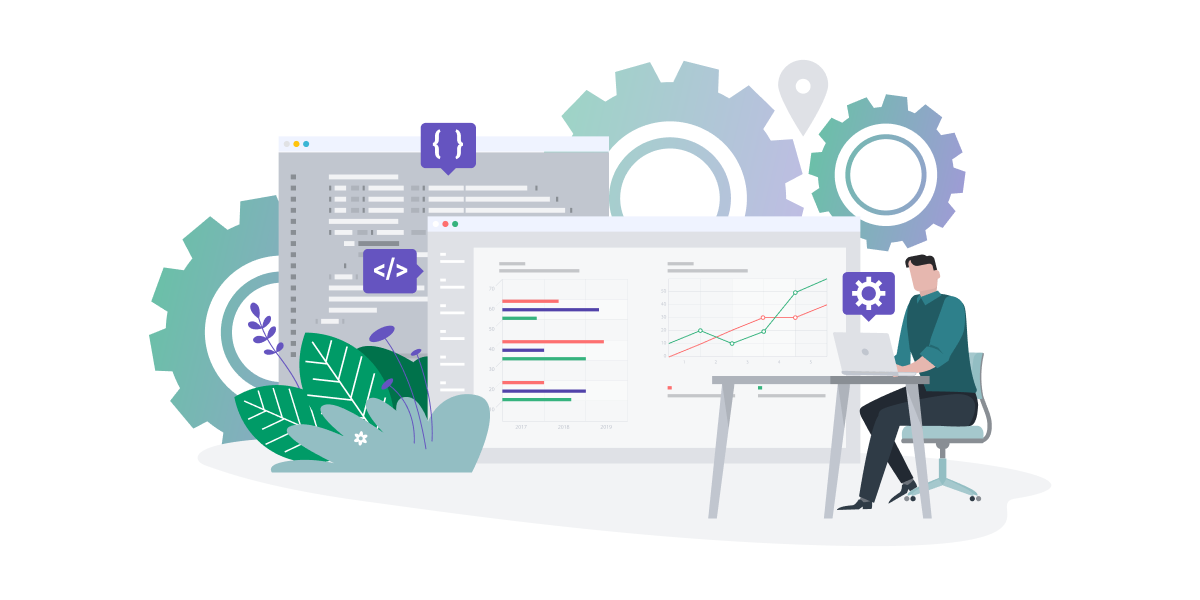
Will Java be Relevant in 2026 and Beyond?
Java will remain a popular programming language, with a strong community, vast ecosystem, and a proven track record. Its versatility in supporting various platforms, including cloud and mobile, makes it a top choice for businesses that want to develop and scale applications.
The demand for Java developers is expected to continue growing in the coming years, especially with the rise of technologies like AI and DevOps. Softjourn has a team of expert Java developers that can help you achieve your development goals.
We can also assist in determining if Java is the right language for your project. If you're interested in learning more about how we can help your business succeed, please don't hesitate to contact us.
| Feature | C# | ||||
| Type System | Static | Dynamic | Static | Dynamic | Dynamic |
| Object-Oriented | Yes | Yes | Yes | Yes | Yes |
| Functional Programming | Yes | Yes | Yes | Yes | Partial |
| Platform Independence | Yes | No | Windows Only | Web | Web |
| Garbage Collection | Yes | Yes | Yes | Yes | Yes |
| Popular Frameworks | Spring, Hibernate | Django, Flask | |||
| Performance | High | Moderate | High | Moderate | Moderate |
| Community | Large | Large | Large | Large | Large |
| Syntax Simplicity | Moderate | High | High | High | High |
| Learning Curve | Moderate | Low | Low | Low | Low |
| Database Integration | JDBC | SQLAlchemy | ADO.NET | N/A | MySQLi, PDO |
| Web Development | Yes | Yes | Yes | Yes | Yes |
| Mobile Development | Android SDK | Kivy | Xamarin | N/A | |
| Scripting | No | Yes | No | Yes | Yes |
Final Word
Programming languages are the most basic tools in any programmer's toolbox. Choosing the right language can be overwhelming, but with all the right information, you can understand what’s the best way to go for your project.







